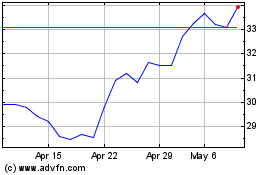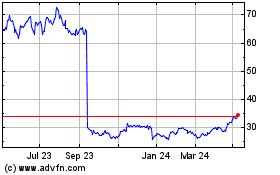Tencent's Biggest Investor Cashes In on Pandemic Rally
April 07 2021 - 9:15AM
Dow Jones News
By Alexandra Wexler in Johannesburg and Jing Yang in Hong Kong
JOHANNESBURG -- Tencent Holdings Ltd.'s largest shareholder is
selling up to $14.7 billion worth of stock in the Chinese internet
and videogaming giant, cashing in on one of the most lucrative
technology bets in history after the pandemic gave a huge boost to
the sector.
Internet conglomerate Prosus NV said Wednesday it plans to cut
its stake in Tencent to 28.9% from 30.9%, selling about 192 million
shares, to increase its financial flexibility to invest in growth
ventures. It is also the latest attempt to narrow a persistent gap
between the company's market value and that of its stake in
Tencent.
In 2001, Prosus parent Naspers Ltd., Africa's largest-listed
company, paid $34 million for a one-third stake in Tencent before
it went public. Hong Kong-listed Tencent, the world's largest
videogame company by revenue and operator of the popular WeChat
do-everything app, is now China's most valuable publicly listed
company with a market capitalization equivalent to $775.9
billion.
The Tencent shares that Prosus is selling were marketed to
investors at HK$575 to HK$595 a share, equivalent to $73.94 to
$76.51 a share, representing a 5.5% to 8.7% discount to Tencent's
Wednesday closing price, according to people familiar with the
matter. Even before the offering's launch, investors had lined up
to buy about three-quarters of the shares, the people said.
Prosus said Tencent understands and supports its intention. A
spokesperson at Tencent declined to comment further.
Shares of Tencent have been on a tear over the past year,
hitting a record high in late January and briefly valuing the
company at more than $900 billion, after millions of Chinese
consumers flocked to the company's apps and videogames during the
pandemic. Tencent has also become an investment powerhouse,
gobbling up stakes in other fast-growing technology companies, such
as Snap Inc. and Chinese e-commerce firm Pinduoduo Inc.
Tencent shares have given up some gains during a broad selloff
in Chinese tech stocks that was partly triggered by investor
concerns over Beijing's crackdown on big internet platforms.
Tencent Chief Executive Pony Ma said on the company's earnings call
last month that the company was working closely with the government
on compliance issues.
Wednesday's share sale isn't the first time Naspers, which
listed its international assets in Amsterdam -- creating Prosus --
in September 2019, has sold down its Tencent stake.
In March 2018, Naspers sold 190 million shares of Tencent,
cutting its stake in the company to 31.2% from 33.2%, collecting a
$10 billion windfall. At that time, it hadn't sold any of its
Tencent stock before and said it wouldn't sell any more of its
shares for at least three years.
Some investors had been expecting Prosus to pare its stake in
Shenzhen-headquartered Tencent after the moratorium on share sales
expired last month.
On Wednesday, Prosus said it had made a new commitment to not
sell any further Tencent shares for at least the next three
years.
Naspers, a South African newspaper publisher turned technology
giant, has long struggled to bring its own market capitalization
closer to that of its stake in Tencent.
The creation of Prosus initially narrowed the gap, but more
recently the valuation differences have grown again.
Johannesburg-listed Naspers, which owns 72.5% of Prosus, has a
market capitalization of 1.51 trillion South African rand,
equivalent to $104 billion, while Prosus has a market
capitalization of 152.4 billion euros, about $181.1 billion. The
value of Prosus's near 31% stake in Tencent, meanwhile, is about
$240 billion.
"In one sense, [the sale] helps to reduce the concentration of
Tencent in the portfolio, which should help reduce the discount,"
said Neelash Hansjee, portfolio manager at Old Mutual Equities in
Cape Town, South Africa. However, if the cash is invested in growth
assets that are likely to incur losses in the short-term, "It just
kind of balances out any effect [of the sale] anyway [and] the
discount could widen."
Prosus also holds investments in tech companies such as Russian
social-media operator Mail.ru Group Ltd., German food-delivery
business Delivery Hero and U.S. online marketplace Letgo.
Analysts have attributed the persistent valuation gulf to a few
issues. One is that holding companies consistently trade at a
discount to their underlying businesses. Second is a
dividend-withholding tax that Naspers would need to pay should it
sell its stake in Tencent and distribute the proceeds to investors
-- a scenario that Naspers executives have said unlikely.
Another reason for the difference is lack of liquidity:
Investors can also gain direct access to Tencent shares through its
Hong Kong listing.
Shares in Prosus recently traded down 5% at 93.54 euros
($111.19).
Write to Alexandra Wexler at alexandra.wexler@wsj.com and Jing
Yang at Jing.Yang@wsj.com
(END) Dow Jones Newswires
April 07, 2021 09:00 ET (13:00 GMT)
Copyright (c) 2021 Dow Jones & Company, Inc.
Prosus NV (EU:PRX)
Historical Stock Chart
From Feb 2025 to Mar 2025

Prosus NV (EU:PRX)
Historical Stock Chart
From Mar 2024 to Mar 2025
